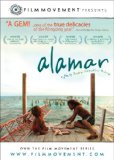| Reviews & Columns |
|
Reviews DVD TV on DVD Blu-ray 4K UHD International DVDs In Theaters Reviews by Studio Video Games Features Collector Series DVDs Easter Egg Database Interviews DVD Talk Radio Feature Articles Columns Anime Talk DVD Savant Horror DVDs The M.O.D. Squad Art House HD Talk Silent DVD
|
DVD Talk Forum |
|
|
| Resources |
|
DVD Price Search Customer Service #'s RCE Info Links |
|
Columns
|
|
|
Alamar

I am still processing my reaction to Alamar, a very small film filled with emotion that is carefully obscured by a lack of dialogue and a visual technique that favors sea and sky over the faces of its characters. There is something very rich about Alamar as an atmospheric experience; it places the viewer in the middle of alien land- and seascapes, and the three chief characters spend most of the picture fishing. There is a good dose of Hemingway here - not the swaggering insistence upon metaphoric "significance," but the interest in how nature shapes people is present, and so is the pared-back style. But writer-director Pedro Gonzalez-Rubio is not trying to emulate anyone else's style. He has very particular interests - in the father-son relationship that the story depicts and in capturing a rare lifestyle that, despite editorial precision, occasionally receive too much screen time. At 73 minutes, Alamar is far from an epic; yet its brevity is insufficient. Alamar is affecting, but it may have been more so a half-hour short.
Gonzalez-Rubio first shows us five-year-old Natan being prepared for a trip to visit his father, who lives in a remote fishing outpost off the coast of Mexico. His Italian mother stays behind in the city, where she awaits Natan's return, and their eventual move to Rome. Natan and his father, Jorge, spend the bulk of the film fishing together, under the watchful eye of a veteran fisherman. Their very simple life together consists of nights eating and sleeping in a shack sitting on stilts in the harbor and days learning to fish. We see Jorge trying to instill a very old way of life in his son, who we understand is going to grow up in highly cosmopolitan surroundings. We see Natan form a stronger bond with Jorge and with the old man. We also feel the impending pain of Natan's move to Rome - a move that will put a continent and an ocean between him and his father.
Alamar is successful on some levels; in other ways, it doesn't work at all. Gonzalez-Rubio uses deep silence - long stretches free of dialogue - to document the sea-bound culture that is Jorge's (and Natan's) heritage. These documentary-like passages have poetry, but they move against the storytelling imperative of feature filmmaking. Strictly speaking, the story - which consists almost solely of the relationship between Jorge and Natan - stands still while the camera allows its investigative eye to linger on shots of the waves, fishing techniques, and other silent or near-silent activity. These sequences of stillness and silence aren't without interest, but they are too long, and their length works against the development of narrative or emotional momentum. We quickly come to understand the solitude, the foreignness, and the unique qualities of Jorge's way of life from the initial scenes in which Jorge and Natan are ferried out to a spot in the middle of the ocean, where they meet the old man's fishing boat. The remoteness and silence speak for themselves.
The inevitability of Jorge and Natan's impending separation hovers sadly in the atmosphere throughout the entire film. Their parting, however, is not dramatized. Emotion is perhaps too understated in Alamar, a film that skillfully avoids cliche and convention, but is perhaps also afraid of being direct. The emotional heart of Alamar, while detectable at the film's fringes, is balanced uncomfortably between artful suggestion and willful obscurity. Gonzalez-Rubio may be uncomfortable depicting naked emotion, or mistrustful of it. I think Alamar's success at festivals and with many critics is due to this same nervousness - a symptom of what may be a larger problem. Although ambiguity has enormous value in the cinema, I begin to suspect the wisdom and intentions of a filmmaker who favors shots that are not about people to shots that are about people, especially when the narrative grafted onto the documentary-style framework of Alamar is clearly meant to evoke something poignant about family and human relationships. Too often, however, we skirt past the really difficult bits that pertain to these latter matters, and settle on something that we claim to be metaphorically significant or otherwise related to them, fooling ourselves all the while that this disengagement is really engagement.
The DVD
Image and Sound
As always, Film Movement has produced a very nice DVD product. The 16:9 transfer has a realistic look characterized by the blue of the water and sky, and the earth tones of the tiny fishing village where Jorge lives. The transfer itself is strong, with very good contrast, even though the film's color palette is light overall. The stereo soundtrack is good, but not as well-separated as it could have been. It's front-heavy, with ocean noises a bit too forceful rather than being enveloping.
Bonus Content
Aside from a few text-based features, the main bonus is Film Movement's standard addition of a noteworthy short film, in this case Take It Easy by César Díaz Meléndez, an amazing and technically impressive experiment with sand animation.
Final Thoughts
While suffused with merit of different kinds, Alamar left me a bit cold. Its quasi-documentary format never managed to completely convince me that we were spending time with either real people or fictional characters. Director Gonzalez-Rubio's camera probes Jorge's environment with great curiosity and an eye for nature's beauty, but shies away from the inner life of his characters. Rent it.
|
| Popular Reviews |
| Sponsored Links |
|
|
| Sponsored Links |
|
|
| Release List | Reviews | Shop | Newsletter | Forum | DVD Giveaways | Blu-Ray | Advertise |
|
Copyright 2024 DVDTalk.com All Rights Reserved. Legal Info, Privacy Policy, Terms of Use,
Manage Preferences,
Your Privacy Choices | |||||||














